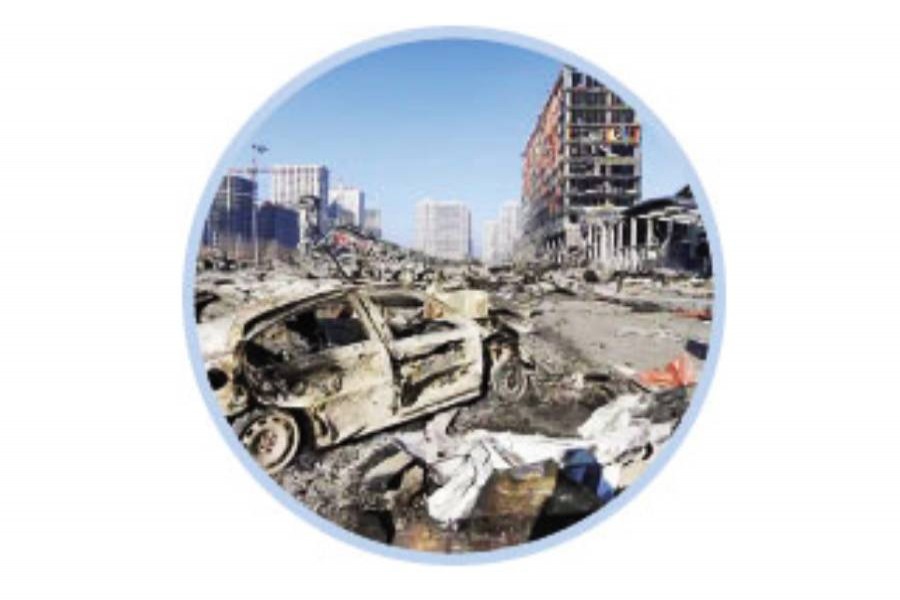
Published :
Updated :

Kremlin spokesperson Dmitry Peskov's comment that there has not been much progress in the negotiations one day after the Ukrainian and Russian delegates sat in Istanbul of Turkey has only confirmed Western misgivings about any positive outcomes from the talks. In fact, none of the similar talks between Russia and Ukraine held previously in Belarus and Turkey produced any result. So, if there were any high hopes about the Istanbul talks, it was misplaced. Small wonder that the Russian assurances of 'boosting mutual trust' by scaling back its military operations around Chernihiv and capital Kyiv as made in Istanbul have not materialised as expected. For, there has been no letup in the bombardment of Chernihiv.
In Kyiv, it appears, the Russian forces are being repositioned. But that does not mean that they are leaving the place. Meanwhile, the Russian side has intensified its pressure on the city of Mariupol asking the Ukrainian troops there to surrender. What do all these developments mean for the future of the armed conflict in Ukraine? What is then the purpose of any peace talk, if there is no semblance of peace after the talks?
The Western powers seem to have been closing their ranks following Russia's starting the war against Ukraine. The misunderstandings that had been created among the partners of the North Atlantic Alliance since Trump's presidency in America appear to have been removed in some measure. Even so, in the absence of the Cold War era compulsions that cemented the unity of the NATO (North Atlantic Treaty Organization) members, it will be hard to hold this unity for long. Is a prolonged Ukrainian conflict a guarantee for a stronger, more united NATO? There are serious doubts about that. For, present Russia, though a formidable nuclear power, is not perceived as a threat to capitalism as it was the case with the erstwhile Soviet Union before 1991. True, the present Russia is not run by a liberal democratic government like in many Western nations. But it is not a communist state either. And who does not know that the very purpose of the military alliance, NATO, was to protect capitalist system from a possible attack from the communist Soviet Union? Obviously, the objectives of the military alliance would not be as focused now as it was during the Cold War.
Meanwhile, US president Joe Biden's diplomatic faux pas at the end of his speech in Warsaw recently has raised a few eyebrows in the West. For his unguarded remark meaning Vladimir Putin should not be in power may send a wrong message to Kremlin about the West's real intent regarding Russia. In that case, the path to a solution to the Ukraine crisis may take a more tortuous turn. Many European leaders have expressed their unease about the issue. Even the United Kingdom, which proved to be the most ardent critic of the Kremlin and the first country in Europe to supply arms to Ukraine to fight Russia since the war erupted, has tried to distance itself from Biden's off-the-cuff comment on Putin. The country's foreign secretary Liz Truss even suggested that some sanctions against Kremlin might be lifted if its leaders are ready to end conflict and commit to not engage in any further aggression against Ukraine.
If truth be told, the Ukraine war has put Western Europe in a tricky situation. Putin's military action in Ukraine is looked upon in the West purely as an ill-conceived military adventure. Miscalculations on the part of Moscow were definitely there. For the solidarity that the Ukrainian people have demonstrated by putting up a stiff resistance against the Russian invasion was perhaps missing in Kremlin's calculations. This unexpected situation must have caught Kremlin's generals off guard. But at the same time, it has also to be kept in mind that what Moscow has done has done with the full knowledge of its consequences. And it appears, Kremlin is ready to pay the price, maybe short of nuclear war, to get a result out of its Ukraine campaign. Its very targeting of civilian installations including hospitals and schools is undeniably deliberate and is aimed to strike fear in the people. That millions of Ukrainian refugees (it has already crossed 4.0 million mark) are entering Europe will not only strain the region's resources, it will also put its leaders' resolve to test.
The Russians also know that the sanctions are also not a one-way street. The sanction-givers will also feel the pinch. And the world's food grains market has meanwhile turned volatile as the wheat supplies from the major producers, Ukraine and Russia, have halted due to the war as well as sanctions. Then comes the issue of the all-important energy-oil and gas from Russia. India, for example, has not joined US's sanction bandwagon, but looking for transacting an energy deal with Russia bypassing US dollar. Surprisingly, America has given its approval to the Indian stance.
How long will Europe, especially, Germany, deprive itself of Russian gas? Kremlin did take all these factors into consideration before it planned its military action against Ukraine. As there is no ultimate winner in any war, there will also be none in the Ukraine war. Hopefully, good sense will prevail. The Western powers and Moscow should be able to show more pragmatism and proactiveness in resolving the Ukraine crisis before it begins to fester.
sfalim.ds@gmail.com


 For all latest news, follow The Financial Express Google News channel.
For all latest news, follow The Financial Express Google News channel.